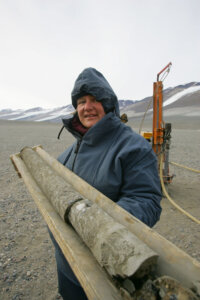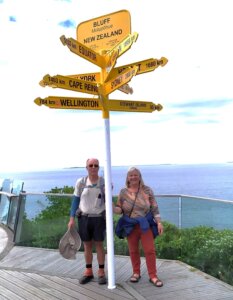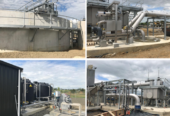
Megan Balks of Waikato University works in -15 c wind chill conditions in the Wright Valley one of Antarctic’s dry valleys. ©Antarctica New Zealand Pictorial Collection.
Megan Balks has been awarded the New Zealand Antarctic Medal for her services to Antarctic soil science in the 2024 New Years Honours list.
“It is really lovely, I don’t necessarily feel like I deserve to be singled out, in some ways I feel it is far more than I ever deserve,” she said.
Balks owns a small hill country sheep farm at the end of Pekanui Road, 18kms south west of Pirongia which includes over 20ha of QEII covenanted forest.
From there, she pursues her interests in wool crafts, landscape art, photography and geology.
She and her husband of 45 years, Errol, have lived there for the past 16.
Balks says it is somewhat of a return to her rural roots, having grown up on a Wairarapa sheep farm.
Balks completed a BSc (Hons I) in Soil Science at Massey University and worked for three years for DSIR Soil Bureau undertaking soil surveys for irrigation development in Central Otago then moved to the University of Waikato where she was employed as a “junior lecturer” and completed her PhD on “Impacts of meat workseffluent irrigation on soil physical properties”.
In 1990, she joined other soil scientists beginning research into permafrost and human environmental impacts in Antarctica, going on to complete 19 Antarctic expeditions, 12 as field leader.
Her most recent trip was in 2016.

Errol and Megan Balks
“Every one has been the adventure of a lifetime,” Balks told The News on Tuesday.
While the nature of soil research and of itself is specific and calculated, my favourite aspect is absolutely exploring the Antarctic environment.
“Soil science is obviously a very particular line of work and those fantastic experiences have led to me having the wonderful
experience of making lifelong friends from all over the world.”
“Lots of people tend to perhaps glamorise the Antarctic environment, and it is wonderful, but I just love the outdoors so walking something like the Tongariro Alpine Crossing is amazing too.
Balks’ inaugural 1990 trip, she says, was possible thanks Antarctic soil research pioneers Drs Iain Campbell and Graeme Claridge.
“They opened doors to opportunities I could never have dreamed of.”
Through this research, a series of Antarctic soil climate monitoring stations were established that contribute to an international programme to monitor the effects of climate change in polar regions.
Since retiring in 2018, Balk has written an award winning book on the soils of Aotearoa New Zealand and she has also served on the
Waikato Conservation Board and the QEII National Trust.








